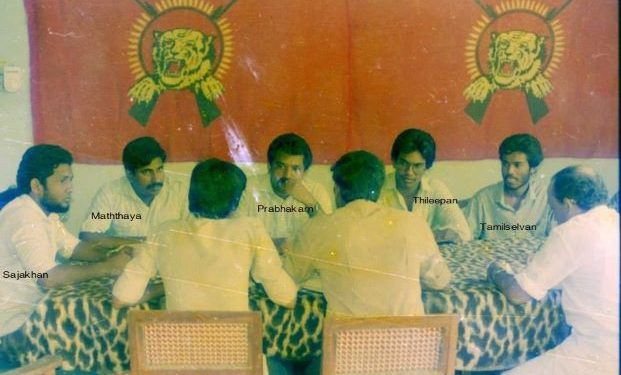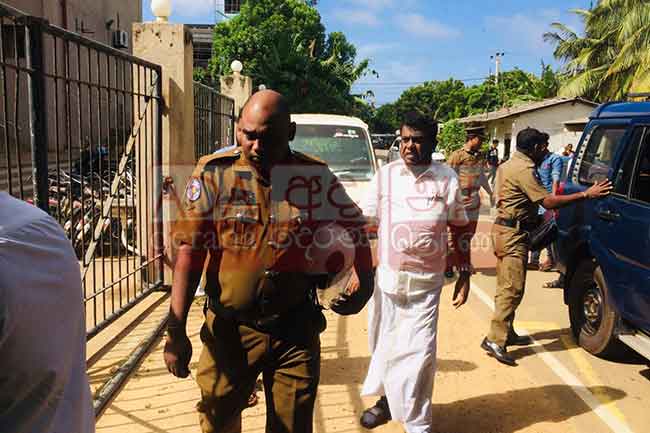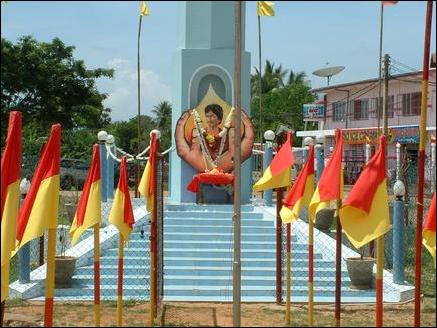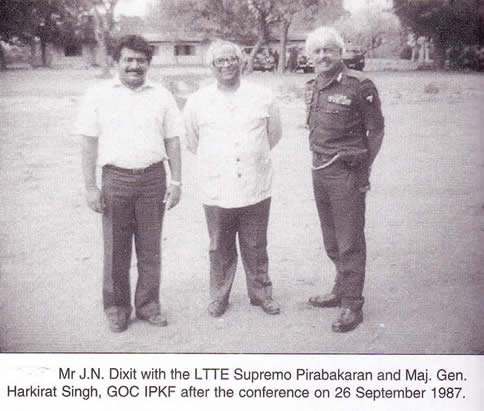Consequences of the commemoration of an LTTE hero’s death
Posted on September 18th, 2020
By P.K.Balachandran/Weekend ExpressCourtesy NewsIn.Asia
Besides exacerbating Tamil-Sinhala ethnic tension in Sri Lanka, the commemoration of Thileepan’s death could sour the Lankan Tamils’ relationship with India

Colombo, September 17: The commemoration of the 33 rd.Anniversary of the fast-unto-death of the Tamil Tiger hero Thileepan this year has become an issue in Sri Lankan politics. It has the potential to further sharpen the divide between the Tamils and the Sinhalese and sour the Tamils’ relations with India, whose help they are seeking to safeguard the 13 th. Constitutional Amendment, which is now under threat from Sinhala radicals entrenched in the current Sri Lankan regime.
The Tamil-Sinhala division surfaced after the arrest of former Tamil MP M.K.Shivajilingam for commemorating Thileepan’s fast unto death in September 1987, in the aftermath of the India-Sri Lanka Accord. The Jaffna district police had obtained a court order against the commemoration on the grounds that no member of a banned terrorist organization could be honored. The magistrate acceded to the police’s request to bar the event disregarding the defense’s argument that in the past, the commemoration had taken place with the consent of the government and the court. Shivajilingam was arrested when he held a ceremony in defiance of the ban and was later released on bail.
However, the issue is unlikely to rest there as Tamil political parties are making it an issue to build their strength vis-à-vis each other and the Sinhala nationalist government of President Gotabaya Rajapaksa. The Ilankai Tamil Arasu Katchi (ITAK) called for a meeting of the Tamil National Alliance (TNA) to discuss the issue of new restrictions on commemorating heroes of the Tamil liberation struggle and other grievances of the Tamils. The ITAK leader has now called for a meeting of all Tamil groups, including its Tamil rivals, to chalk out a common agitation program. The wide media coverage given to Shivajilingam’s arrest has made the commemoration a Tamil” issue. A routine annual event which would not have caused even a ripple if allowed to take place has been made a divisive public national security” issue by the ban and the arrest, a moderate Tamil leader said. If the issue snowballs, the State would react, further exacerbating the issue and sharpen the ethnic divide, the moderate leader feared.

The first shot from the pro-government side was fired by Dr.Rohan Gunaratna, an international expert on terrorism, who is now Honorary Professor at the Sir John Kotelawala Defense University. Those who glorify terrorists should be arrested, charged, tried, and given the maximum punishment to deter others from following their destructive path. It will deter others funded by LTTE front organizations in the Tamil Diaspora from reviving the separatist agenda of the LTTE,” Dr.Gunaratna said.
The LTTE’s propaganda and paraphernalia should remain banned forever, just as Germany banned Nazi symbols and activities after World War II. It is LTTE propaganda that fosters an environment for LTTE plots, plans and preparation aimed at revival,” he pointed out.
The tolerance of democracies revives violence, he added. Research demonstrates that if there is looseness (government neglect) as opposed to tightness (government vigilance), terrorist groups exploit the gaps and loopholes and come back,” Dr.Gunaratna said.
If a democracy permits display of terrorist paraphernalia and allows the dissemination of propaganda, the next step will be protests and demonstrations breaking out into violence. Like the Islamic State and al Qaeda, LTTE glorified death. If commemoration and celebration of death are permitted, it will lead to a culture of destruction,” Dr.Gunaratna warned.
According to him, there have been a dozen plots by the LTTE to revive since the end of Eelam War IV in May 2009. Most of the LTTE plots were supported by LTTE fronts overseas. The number of plots increased due to the delisting of LTTE fronts overseas by the Yahapalanaya government in 2015, he alleged.
It is essential for the government to relist the delisted LTTE fronts overseas as some of them are operating in Sri Lanka. Therefore the security and intelligence platform in Sri Lanka’s north and east should continue for one generation until the separatist ideology disappears,” he recommended.

International Dimension
In addition to the internal divisiveness triggered by the Thileepan issue, there could be an international dimension, which might have a deleterious effect on the Tamils’ relations with India, whose help they are counting on to keep the present system of power devolution intact.
Thileepan’s eleven-day fast unto death which ended in his death on September 26, 1987, was against the then Indian government’s alleged failure to get the Sri Lankan government to implement the agreements entered into in regard to a number of issues. The chief issue at that time was the setting up of an Interim Administrative Council (IAC) before the establishment of an elected North-Eastern Provincial Council with devolved powers.
The former Indian envoy in Sri Lanka, J.N.Dixit, in his book Assignment Colombo” writes that it was clear that the Sri Lankan government was unwilling to delegate financial, law and order and land management powers to the Provincial government of the North and the East.” He further said that the Sri Lankan side also indicated that the constitutional amendment to give Tamil a status equal to Sinhala would be a complicated and prolonged process. There was also little enthusiasm for absorbing Tamil youth into the administrative and security forces of Sri Lanka. All this resulted in a revival of apprehensions among the Tamil groups.”
Dixit said that the LTTE was in daily touch with the Indian Keeping Force (IPKF) HQ in Jaffna, and its chief, V.Prabhakaran, was a frequent visitor. However, by the middle of September the LTTE decided to pull back from the limited cooperation” stance it had taken on the July 1987 India-Sri Lanka Accord.
Finding fault with New Delhi, the LTTE got people to demonstrate against the IPKF. New Delhi moved to press Colombo to set up the Interim Administrative Council (IAC) at the earliest. But Lankan President J.R.Jayewardene was under pressure from Prime Minister R.Pramadasa and Internal Security Minister Lalith Athulathmudali not to give in.

It was at this time that Thileepan, a close associate of Prabhakaran, entered the scene going on a fast unto death. Dixit described him as an idealistic and committed LTTE leader” whose stand was that the India-Sri Lanka Accord did not fulfil the aspirations of the Tamils and that India was not doing enough even to implement the provisions of the agreement.”
According to Dixit, Prabhakaran was insistent” that Jayewardene first devolves all the required powers immediately” to the IAC. He was not willing to wait for the necessary constitutional amendments and the procedural requirements. On page 196, Dixit says that Prabhakaran suspected that Premadasa and Athulathmudali were even planning to pit the Lankan military against Jayewardene if they latter gave in to the Indians and the LTTE.
New Delhi was pressing Dixit to talk to Prabhakaran and reassure him, but Dixit wanted the Indian intelligence agencies to do it as they knew Prabhakaran. Eventually, New Delhi forced Dixit to meet Prabhakaran. Dixit met Jayewardene first. The Lankan President promised to appoint Prabhakaran as Chief Minister and devolve some routine law and order and administrative powers to the IAC.
When Dixit met Prabhakaran, the latter stiffened his stance and said that the LTTE should have a majority in the IAC and also a hand in the choice other members of the IAC including the Chief Administrator. He wanted all policing in the North East to be left to the LTTE. He agreed to submit three names for the Chief Adminisrator’s post allowing Jayewardene to pick one from the list. But when the President picked C.V.K.Sivagnanam, Prabhakaran said it has to N.Pathmanathan. Jayewardene considered this unreasonable and refused to oblige.
In the meanwhile, the fasting Thileepan died. And as if this was not enough there was an imbroglio over the arrest and the simultaneous suicide of 17 LTTE cadres including top leader Pulendran. The LTTE’s confrontation with the IPKF intensified and war broke out, leading to the alienation of India from the LTTE-led Tamil movement.
After the exit of the LTTE from the scene in 2009, India took up the Tamil cause again through the ITAK and the TNA. One wonders if this will suffer a setback when all the Tamil parties blow up the Thileepan issue.